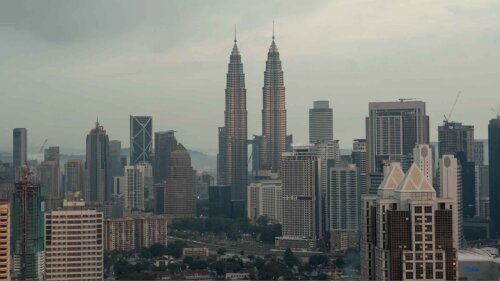Best Data Center & Digital Infrastructure Lawyers in Kuala Lumpur
Share your needs with us, get contacted by law firms.
Free. Takes 2 min.
List of the best lawyers in Kuala Lumpur, Malaysia
About Data Center & Digital Infrastructure Law in Kuala Lumpur, Malaysia
Kuala Lumpur, as Malaysia's capital and financial hub, is rapidly emerging as a key player in Southeast Asia's digital landscape. The city boasts a growing ecosystem supporting data centers, cloud platforms, digital business parks, and internet connectivity infrastructure. This growth is fueled by increased demand for cloud services, big data analytics, and the expansion of e-commerce and tech-driven companies. Data center and digital infrastructure law in Kuala Lumpur covers a broad range of legal issues, including land use, data protection, compliance with industry standards, cybersecurity, intellectual property, cross-border data transfer, and contractual relationships with clients, vendors, and government authorities. Understanding the legal framework is crucial for operators, investors, and stakeholders in this space.
Why You May Need a Lawyer
Engaging in activities related to data centers and digital infrastructure often involves navigating complex local laws and regulations. Here are some common situations where legal assistance is necessary:
- Setting up new data center facilities or expanding existing ones, which involves zoning, environmental, construction, and operational permits.
- Drafting and negotiating service level agreements, leasing contracts, or vendor supply agreements to safeguard your business interests.
- Ensuring compliance with the Personal Data Protection Act (PDPA), cybersecurity requirements, and other sector-specific data regulations.
- Managing cross-border data transfers and understanding restrictions or requirements for sending data outside Malaysia.
- Handling disputes related to service outages, breach of contract, or data breaches that may result in financial or reputational harm.
- Protecting proprietary technology, designs, or software through intellectual property laws.
- Preparing for audits, inspections, or investigations by regulatory authorities.
- Advising on mergers, acquisitions, or investments involving digital infrastructure assets.
Local Laws Overview
Several Malaysian laws and regulatory policies have direct relevance to data centers and digital infrastructure operations in Kuala Lumpur:
- Personal Data Protection Act 2010 (PDPA) - This law governs the collection, processing, and storage of personal data in Malaysia. Data center operators must ensure compliance when handling customer or end-user information.
- Communications and Multimedia Act 1998 - Overseen by the Malaysian Communications and Multimedia Commission (MCMC), this act regulates the communications and multimedia industry, including licensing requirements and standards for network facilities providers.
- Malaysian Cybersecurity Laws - These govern protection against unauthorized access, data breaches, and measures for cybersecurity resilience.
- Building Codes and Environmental Laws - Zoning, land use approvals, and environmental impact assessments are mandatory for data center development.
- Cross-Border Data Transfer Regulations - Data centers transmitting personal data outside Malaysia must fulfill specific requirements under the PDPA and related guidelines.
- Contractual and Intellectual Property Laws - Service contracts, software licensing, and protection of proprietary information are regulated under various commercial and intellectual property statutes.
Frequently Asked Questions
What licenses are required to operate a data center in Kuala Lumpur?
You may need network facility provider and network service provider licenses from the Malaysian Communications and Multimedia Commission, along with other relevant business, construction, and environmental permits. Legal counsel can help identify and secure the required authorizations.
Does the PDPA apply to all data processed in a Malaysian data center?
Yes, the Personal Data Protection Act applies to any processing of personal data related to commercial transactions in Malaysia. Operators must ensure compliance with PDPA obligations, data subject rights, and security standards.
Can we transfer data stored in a Kuala Lumpur data center outside of Malaysia?
Transferring personal data outside Malaysia is permitted with restrictions. You must ensure the receiving country has adequate data protection standards, or obtain explicit consent, or fulfill other conditions stipulated by the PDPA.
What are the typical compliance requirements regarding cybersecurity?
Data center operators must implement robust cybersecurity measures, such as secure network architecture, regular vulnerability assessments, physical controls, and incident response plans. Sector-specific guidelines and international standards may also apply.
Who regulates data centers and digital infrastructure in Kuala Lumpur?
The primary authority is the Malaysian Communications and Multimedia Commission (MCMC), supported by agencies such as CyberSecurity Malaysia, local government councils, and the Department of Environment for facility approvals.
What happens in case of a data breach at our data center?
You are required to notify affected parties and may need to inform authorities depending on the nature of the breach. Legal obligations include containing the breach, investigating root causes, and potentially facing penalties under the PDPA or contractual liabilities.
How do we protect our intellectual property used in digital infrastructure?
You should register patents, trademarks, copyrights, or trade secrets for proprietary technology or software. Contracts with clients and vendors should include intellectual property protection terms.
Are foreign companies allowed to own and operate data centers in Kuala Lumpur?
Yes, subject to compliance with local company incorporation, licensing, and foreign ownership regulations. Specific restrictions may apply depending on the type of infrastructure and land ownership.
What should be included in a data center service agreement?
Key terms include uptime guarantees, service levels, liability clauses, disaster recovery provisions, data protection commitments, termination rights, and dispute resolution mechanisms.
What environmental regulations affect data center construction and operation?
Developers must comply with building codes, zoning laws, and, for larger projects, undertake Environmental Impact Assessments as required by the Department of Environment. Sustainability and energy efficiency standards may also be relevant.
Additional Resources
If you are seeking more information or guidance on data center and digital infrastructure matters in Kuala Lumpur, consider reaching out to the following:
- Malaysian Communications and Multimedia Commission (MCMC)
- CyberSecurity Malaysia
- Ministry of Communications and Digital (Malaysia)
- Department of Environment, Malaysia
- Malaysia Digital Economy Corporation (MDEC)
- Local authority councils (for zoning and development matters)
- Legal and industry associations focused on technology, infrastructure, or data protection
Next Steps
If you need legal support for a data center or digital infrastructure project in Kuala Lumpur, consider the following actions:
- Identify your specific legal needs, such as licensing, contracts, data protection, or land development.
- Consult with a qualified lawyer or law firm experienced in technology and infrastructure law in Malaysia.
- Prepare all relevant project documents or information for your initial consultation.
- Stay updated on regulatory changes by subscribing to industry bulletins or contacting regulatory bodies directly.
- Engage in regular compliance reviews and legal due diligence for ongoing or planned operations.
Taking these steps can help ensure your data center or digital infrastructure project is established and operated in compliance with all applicable laws, minimizing legal risk and supporting long-term success in Kuala Lumpur's dynamic digital environment.
Lawzana helps you find the best lawyers and law firms in Kuala Lumpur through a curated and pre-screened list of qualified legal professionals. Our platform offers rankings and detailed profiles of attorneys and law firms, allowing you to compare based on practice areas, including Data Center & Digital Infrastructure, experience, and client feedback.
Each profile includes a description of the firm's areas of practice, client reviews, team members and partners, year of establishment, spoken languages, office locations, contact information, social media presence, and any published articles or resources. Most firms on our platform speak English and are experienced in both local and international legal matters.
Get a quote from top-rated law firms in Kuala Lumpur, Malaysia — quickly, securely, and without unnecessary hassle.
Disclaimer:
The information provided on this page is for general informational purposes only and does not constitute legal advice. While we strive to ensure the accuracy and relevance of the content, legal information may change over time, and interpretations of the law can vary. You should always consult with a qualified legal professional for advice specific to your situation.
We disclaim all liability for actions taken or not taken based on the content of this page. If you believe any information is incorrect or outdated, please contact us, and we will review and update it where appropriate.
















